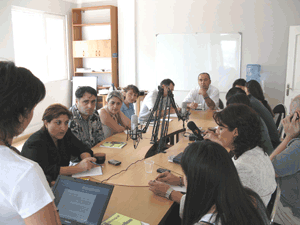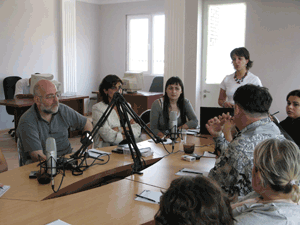 Eka Kevanishvili, Tbilisi
Eka Kevanishvili, Tbilisi
The Georgian regional media found itself in such a difficult situation both during and after the recent armed conflict between Georgia and the Russian Federation. Consequently many regional newspapers might be shut down in the nearest future. “We had foreseen all possible risks with the exception for war,” state editors of regional newspapers.
Representatives of regional media outlets gathered in Tbilisi office of Institute for War and Peace Reporting to speak out about the problems they faced while covering the Russian-Georgian war and difficulties in the post conflict period in Georgia. The aim of the round table discussion was to inform international organizations about the problems faced by Georgian journalists. The representatives of media outlets from all regions of Georgia complain that the prices on paper have increased, distribution prices are higher, and the advertising market has stopped functioning for all practical purposes. Clients have discontinued contracts with various media outlets. In light of the many problems Georgian journalists are looking for the way out of the current situation.
The technical equipment of Gori-based TV Company Trialeti was completely destroyed during the war.
Joni Nanitashvili, director of TV Company Trialeti recalls that the staff was intending to work as long as it was possible. The TV Company had been broadcasting on a regular basis until transmitters were blown up on Gori’s TV antenna:
“The Georgian government’s media center was established in our building. We worked till the very last moment. When other TV stations were spreading the news that the Russian troops were in Tskhinvali was at the very moment they had already arrived to Gori. We left the building without taking any apparatus with us. When we returned there was nothing left. Except for several disintegrated computer hard drives. We applied to several international organizations and requested about 169, 000 GEL for first hand rehabilitation of our station. In the meantime we received partial funding of the total amount. International organizations will buy 48 000 US Dollar cost worth of TV equipment. We hope to start back broadcasting on September 25 but unfortunately we won’t be working out of the same TV station where we worked before.”
Newspaper Batumelebi also has faced problems. Nestan Tsetskhladze, Batumelebi’s journalist recalls that the newspaper distribution became problematic on the very fist day of the war as the newspaper was being printed in Tbilisi. The newspaper was also unable to publish one issue as a result of the war.
“We were confused by the fast developments of the situation. We were not ready for working in such circumstances.
The printing house printed newspapers with smaller circulation. Consequently, we were unable to provide 1000 subscribers with the newspaper. Once we published 8-pages and the other time 12 pages in stead of the regular 24 pages. The thing is that our newspaper has been trying to be self-sustainable and not to be dependent on grants for a long time. Therefore, we had been working hard to earn as much from advertisements and subscribers as possible. Unfortunately, we were forced to do what we had never done since our establishment (2001): we increased newspaper price up to 70 tetries and this has caused problems with our readership. The number of subscribers has decreased as well. We could not launch one Armenian project which was planned for the tourist season. The price of newspaper distribution from Tbilisi to Batumi has increased two fold. We are now paying 80 GEL in stead of the previous 40 GEL,”
In total, this means that the fate of newspaper Batumelebi depends completely on its readership
Situation is difficult in Samtskhe-Javakheti region where Georgian-Armenian edition “Samkhretis Karibche” totally lost its internet connection. However, this edition, that was not sold out at all and was distributed with the support of subscription, had a very well-organized distribution system.
Lela Inasaridze, “Samkhretis Karibche”: “If Georgina newspaper needs one copy editor, one translator and so forth and so on. Costs are higher because we have to translate everything from Armenian into Georgian and vice-versa. Without internet it was impossible. We calculated and concluded that unfortunately, regardless the price of the newspaper 90 % of its income is spent on its distribution and remains only 10 % and this amount cannot even cover the cost of communication. If we had any contracts with companies, today everybody refuses cooperation. For example, we had negotiations with several local entrepreneurs to publish ads of their shops in our newspaper. However, it turned out that after the war the tax inspection service started to raid their business and it is impossible to continue negotiations with them. People also avoid subscribing and buying newspapers and this was not because they are not interested in reading but their income has been extremely reduced their and they tried to buy as much food as possible in order to have a reserve supply. Under such circumstances the future perspective for the newspaper remains most obscure but it would be a crime if the Armenian version of the “Samkhretis Karibche” would be closed down as locals have no other source to obtain information.”
Website of the newspaper “Guriis Moambe” became a victim of a hacker attack during the recent war. Lado Menabde, the editor of the newspaper, states that “Guriis Moambe” was the only edition that increased its circulation but not all benefited.
“The situation was changing each and every hour and only one edition a week proved to be nonsense. We had problems in paper as well and instead of eight pages we printed only 4.
Today everybody expects something and businesspersons are facing similar situations. Until the situation is not cleared up in the end they will not take some steps to post various ads in newspapers. So, we will also have to work in such regime at least for the next four months. Nevertheless, if we do not take some preventive measures immediately, in four months we might be making even worse statements. You can judge-the price of our newspaper is 30 tetri and releasing of one edition requires 280 GEL. So, how many issues we should sell to cover these basic expenses?
The situation is the same in the Kakheti region of east Georgia.
Maia Kalabegashvili, editor of the newspaper “Spektri”: “People were extremely panicked in Kakheti during the war situation. Consequently, population of Tbilisi and western Georgia arrived in Kakheti. There is not family in the region who did not host several IDPs. Locals have used up all their material resources. In addition, some scared people purchased as much as 30 sacks of wheat flour, 20 liters of cooking oil, tooth-pastes. So, when you visit local people and ask to subscribe in our newspaper it becomes a bit awkward.
For example, today the director of the printing house declared to me that cannot print the newspaper in the same price and if they do not import paper within a month, they will totally stop their activities.
As for advertisers, they claim that the state has extorted all the resources they had in Kakheti. Those advertisers are both big and small entrepreneurs. For example, “Begi Company” which had contract on one-year cooperation with us, reduced the contract to four months…
The worse situation was in Imereti region where one of the most famous editions “Akhali Gazeti” was not issued during the war situation at all and still is not being printed. Maia Metskhvarishvilim “Akhali Gazeti”: “We have six-month-contracts with our subscribers and in August we usually take two-week holidays; afterwards we renew again our activities. During the war period we could not continue to work. Moreover, our advertisers are banks and it is clear what the situation in the country in this field was during the crisis situation. We also print our newspaper in Tbilisi and since the road was blocked we could not receive or distribute the newspapers. Now we have some small sum remained from one of the grants and it will be enough to release several new editions. However, it is only a temporary fix and we are thinking of developing on-line media because the price on the printed newspapers has increased and continues to increase catastrophically. Moreover, people are simply not buying newspapers these days.
Maia Mamulashvili, editor of the newspaper “Kakhetis Khma” stated that  “Sakpresa” (Georgian printed media) has recently closed several news booths in Telavi. So there is no permanent places where people are able to buy newspapers.
“Sakpresa” (Georgian printed media) has recently closed several news booths in Telavi. So there is no permanent places where people are able to buy newspapers.
The only way out for the correspondents of the regional newspapers is regulation of the advertisement market. However, nobody will compel their main advertisers- banks, insurance companies and other local entrepreneurs so they can invest money in newspaper advertisements.
Journalists Zviad Koridze stated that it is too difficult to prescribe what will save regional media. The only suggestion that might resolve the problem, at least partially, is to establish several minor printing presses in Georgia. The newspapers should initiate the creation of such bases and the most important point to consider is that a printed shop should not be connection to only one newspaper.



